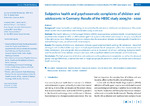Subjective health and psychosomatic complaints of children and adolescents in Germany: Results of the HBSC study 2009/10–2022
Reiß, Franziska
Behn, Steven
Erhart, Michael
Strelow, Lisa
Kaman, Anne
Ottová-Jordan, Veronika
Bilz, Ludwig
Moor, Irene
Ravens-Sieberer, Ulrike
Background: Subjective health and well-being are important health indicators in childhood and adolescence. This article shows current results and trends over time between 2009/10 and 2022.
Methods: The Health Behaviour in School-aged Children (HBSC) study examined subjective health, life satisfaction and psychosomatic complaints of N = 21,788 students aged 11 to 15 years in the school years 2009/10, 2013/14, 2017/18 and in the calendar year 2022. Multivariate regression analyses show the associations between sociodemographic characteristics and well-being in 2022, as well as trends since 2009/10.
Results: The majority of children and adolescents indicate a good subjective health and high life satisfaction. About half of the girls and one third of the boys report multiple psychosomatic health complaints, with a clear increase over time. Older adolescents, girls and gender diverse adolescents are at an increased risk of poor well-being. Subjective health and life satisfaction varied between 2009/10 and 2022, with a significant deterioration between 2017/18 and 2022.
Conclusions: The high proportion of children and adolescents with psychosomatic complaints, as well as the observed gender and age differences, underline the need for target group-specific prevention, health promotion and continuous health monitoring.
Files in this item

